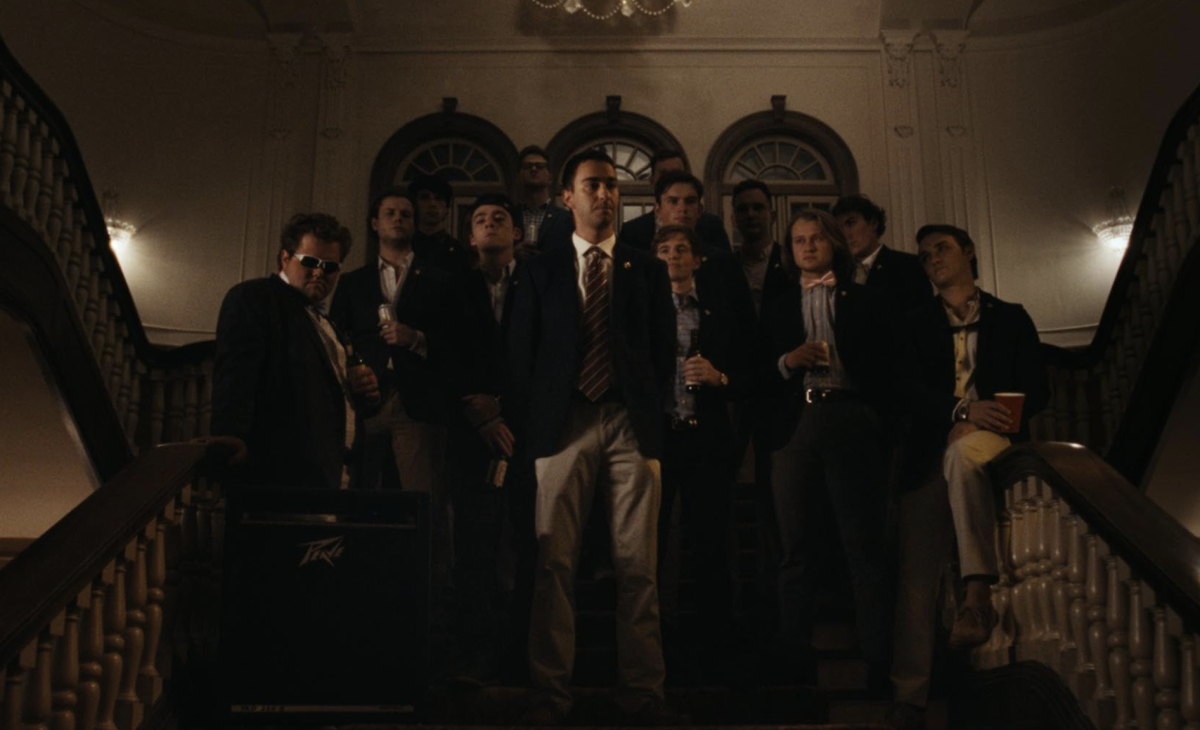Spoiler warning: This review contains spoilers.
There’s something unrelentingly disturbing about a film that can strip an already controversial institution naked and leave viewers feeling shaken, but not surprised. “The Line” sings the tale of the fictional fraternity Kappa Nu Alpha, an organization grounded in the values of fellowship and loyalty. Some 150 years and 17 violations of student conduct codes since its founding, KNA brother Tom Backster (Alex Wolff) is eager to return to campus for his sophomore year at Sumpter College — and more importantly, pledging season.
To join the fraternity’s ranks, fresh-faced pledges endure hazing, just as their brothers, both past and present, have done before. After all, they stand on giants’ shoulders: politicians and CEOs alike have found traction and success through the brotherhood. For Tom, it means a chance to gain status and cultivate future professional relationships — not to mention booze, drugs and a sense of belonging. The film summits when a pledging lineup has horrific consequences, and Tom’s matrix of security crumbles.
Wolff’s embodiment of Tom is a well-studied portrait of someone bent by the pressures of conformity. He is detestable but nuanced. His superficial enjoyment of the social status and sloppy revelry that membership affords him is undoubtedly underscored by a deeper need for assurance and success. He hails from a working-class family in Florida and employs tactics such as adopting a throaty, inarticulate drawl in lieu of his natural voice, to assimilate both socially and professionally among his entitled, devil-may-care peers. His fraccent breaks in moments of panic across the film, making his doctored facade evident. Wolff’s smart portrayal lends to the possibility that, given different circumstances, Tom would be a different person entirely.
Director Ethan Berger paints a naturalistic view of fraternity dynamics, both in terms of its spirit of camaraderie and its more abhorrent qualities. All of the typical locker-room humor characteristic of frat-bro culture punctuates tirades of slurred dialogue. Soapbox speeches harping on tradition and opportunity are ironically transposed over footage of bong rips and cocaine-ridden debauchery. Equally unsurprising is the brand of hazing that pledges endure, which is harrowing but not unpredictable. The tequila bottles and wooden paddles characteristic to the stock image of fraternity life are well-worn props in “The Line.” For the initiated, the hazing aspect of the pledge period is a self-endured ritual that they have earned their right to inflict — a trial-by-fire representation of manhood and growing up.
A supposed gap in life experience is illustrated between the fraternity and its prospective members. The brothers of KNA don crisp suits in a facade of maturity, while pledges are forced to participate in a series of emasculating hazing rituals. Pledge Gettys O’Brien (Austin Abrams) grows increasingly disenchanted by the fraternity’s antics, and Abrams’ standout performance grounds the film with his indignance, elevated by clashes with Mitch Miller (Bo Mitchell), a slovenly shoo-in to the fraternity due to his CEO father’s wealth.
Portrayals of hazing are unflinchingly cinematic, driven by Stefan Weinberger impeccably sullen cinematography. Pale-faced pledges dressed in white appear as the sacrificial lamb as they are berated, abused and egged on by peers. Despite boyhood being pushed down their throats, it’s only when events culminate in a pledge’s death that their maturity is weaponized as an excuse: “he’s a big boy and he made his own decisions.”
The film effectively demonstrates how the brothers embrace KNA as their entire universe and its pervasive importance in their lives. Sumpter College is scarcely mentioned by name and is otherwise merely visible on school banners or spelled out across Mitch’s beaten-down tank top. Meanwhile, Kappa Nu Alpha is repeated throughout the film like a mantra. Seeing Tom and his buddies out and about on campus — not to mention sitting in lecture halls — feels incongruous. This framing is clever, but renders the scope of the film narrow.
For all the brothers’ talk of getting play, Annabelle Bascom (Halle Bailey) — a student who endears herself to a more empathetic part of Tom that he has suppressed — seems to be the only woman to linger within a five-dorm radius of the fraternity’s house. While the film handles topics of hypermasculinity and repression with nuance, merely including brief interludes of strippers and sorority girls at parties extinguishes its ability to explore broader gender dynamics in Greek life with the same complexity.
A sudden two-year timeskip following Tom’s expulsion at the movie’s close brings to light that while his desire for KNA to bring him opportunities was never realized, the fraternity did provide a semblance of belonging: The brothers shared in their endurance and deliverance of pain. A scene where Tom, who now works as a bartender, serves Mitch — who dons a suit and heels as his father’s successor, excused from jail time for his role in the manslaughter — pointing to glaring class inequities that Tom tried so hard to mitigate.
“The Line” succeeds in its visceral depiction of an organization that cannibalizes itself for the sake of ritual, perpetuating cycles of complicity and pain in the name of acceptance. The familiar failures of Kappa Nu Alpha render the film both a twisted coming-of-age story and a cautionary tale.
Contact Eleanor Jacobs at [email protected].


























































































































































